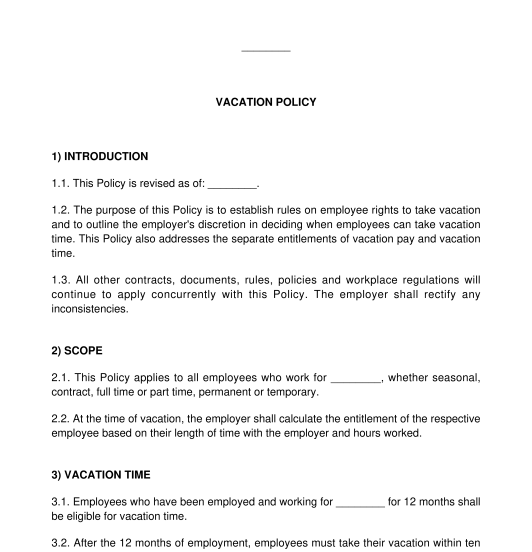 31/10/2025
31/10/2025

Answer a few questions and your document is created automatically.

Your document is ready! You will receive it in Word and PDF formats. You will be able to modify it.

 31/10/2025
31/10/2025
 Word and PDF
Word and PDF
 2 to 3 pages
2 to 3 pages
This Vacation Policy is a document that highlights the minimum legal rights that an employee has regarding annual vacation time and pay. The document allows the user to input greater vacation periods than those provided by minimum employment standards laws.
Vacation time and pay are separate entitlements in most Provinces and Territories. The right to vacation time means the employee can take a leave from work after working for the employer for at least 12 months. Vacation pay means the employer will pay the employee a percentage of their 12-month gross earnings (4% or 6%).
If an employee ceases working for the employer, they are entitled to their vacation pay earned from the start to their last day of employment.
Employers must ensure that employees take their vacation. In many Provinces and Territories, the employee must take their vacation within ten months after they earned it.
Some Provinces require an employer to provide employees with written notice before asking them to take their vacation. In addition, many Canadian Provinces require that vacations be taken in at least uninterrupted periods of at least one week unless the employee requests otherwise.
This policy document is meant to be given from the employer to employees. If the employer has a physical office location, keep a copy of the Policy in a conspicuous place in the event employees also have the option of going to the office. This should be placed in a communal area such as the lunch room.
Employers should include this Policy in a new employee's welcome package to ensure they are familiar with workplace protocol and avoid any future doubt that they were unaware of a specific rule or company policy.
Employees should also sign the acknowledgement at the end of the document confirming they read and understand the Vacation Policy. The employer should then add a copy of the signed Policy to each employee's file.
Employment laws are governed by each Province and Territory. For federal employees, the Canada Labour Code (R.S.C., 1985, c. L-2) applies. These laws establish the minimum requirements for vacation entitlement. In other words, employers may have policies in place that allow for greater vacation time, but it can never be less than the minimum requirements.
There are a number of obligations regarding early and differed vacation, vacation splitting and additional leave. There are some differences between the Provinces and Territories in Canada regarding the minimum entitlement to paid vacation (annual leave).
The following is an overview, by Canadian Province and territory, of the minimum vacation days based on the number of continuous years worked by the employee:
Quebec:
Alberta, British Columbia, Manitoba, Nunavut, Ontario:
Northwest Territories:
Prince Edward Island, New Brunswick:
Saskatchewan:
Newfoundland and Labrador:
Yukon:
Canada (Canada Labour Code):
You fill out a form. The document is created before your eyes as you respond to the questions.
At the end, you receive it in Word and PDF formats. You can modify it and reuse it.
Vacation Policy - Sample, template - Word & PDF
Country: Canada (English)